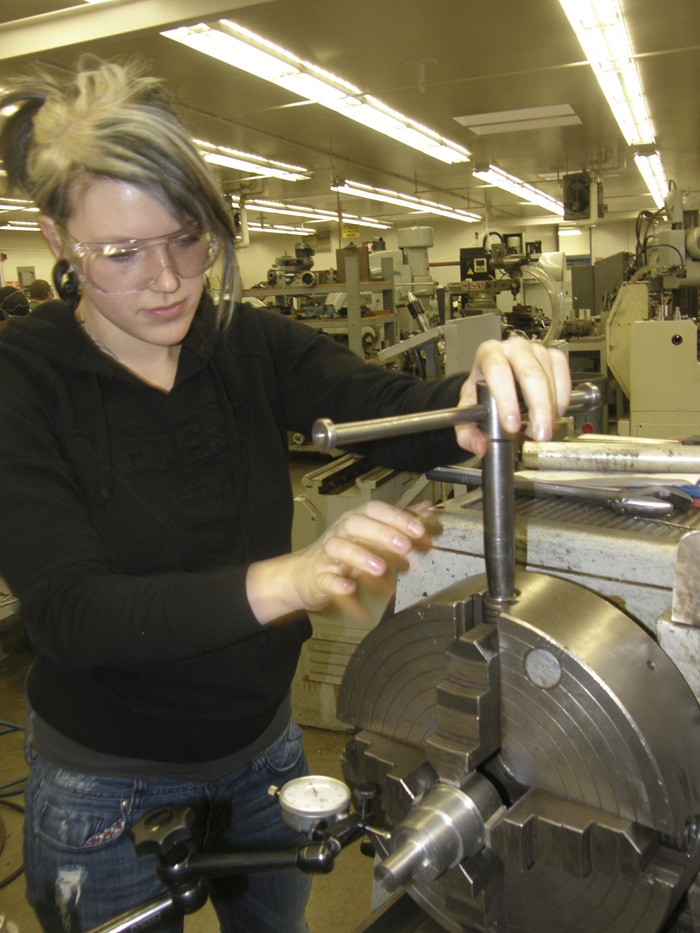Like many people today, 21-year-old Rachell Bechtle of Auburn wanted to upgrade her skills, get into a better trade, land a good job.
Her bright hope, to be a “blue-streak” mechanic — get the blueprint in, make the part — dimmed momentarily when a Boeing apprenticeship she’d been in line for fell through.
But Bechtle’s on her way again, thanks to Green River Community College’s recent decision to became one of the first community and technical colleges in the nation, and one of 11 in the state, to flip the breaker on a new national program machined to put Americans back to work.
The program, Right Skills Now, is a two-quarter certificate in computer-numeric controlled machining. The Manufacturing Institute, an affiliate of the National Association of Manufacturers (NAM), tooled to meet the precise needs of the aerospace industry and move trained workers into jobs that pay well.
“I’m trying to get my foot in,” said Bechtle, working a lathe in her second week of class. “This will also help me to better know the machines, like how to work the lathe, which a lot of blue streakers don’t even know.”
At bottom it’s about the talent crisis pinching manufacturing industries everywhere. A recent study by The Manufacturing Institute and Deloitte reports that more than 80 percent of manufacturers complain that they can’t find people to fill skilled production jobs. As a result, as many as 600,000 manufacturing jobs in the United States right now are going begging.
That’s the gap Right Skills Now means to plug.
“Our ultimate goal is employment in the aerospace industry in Western Washington,” said Maurie Adams, who teaches the precision machining class. “We’re starting from scratch, entry-level employees … The job market in this area is fantastic.”
Joshua Clark, 22, of Bonney Lake, has his eye on such a job.
“I work with composite materials now, but I want to move up to metals … My ultimate goal is to get a job at Boeing. My father’s worked there for 25 years, and I’d like to keep on keeping on.”
The program’s key principles are:
• Fast-tracked, for-credit career training.
• Industry credentials with value in the workplace.
• Pathways to advancement and degrees.
“It’s about short-term training, to be very brief,” said Bob Embrey, director of Corporate and Continuing Education at GRCC. “Industry still values very much the two- and four-year degrees and the certificates that we produce and teach. But there’s a need for short-term training to get more people into the work force pipeline more immediately. The intent is that … somebody could come in and get a certificate of proficiency in one of these three areas that we’re teaching over a two-quarter-long period, go out into the workforce, and then come back, do more and apply it toward a degree.”
Training partners are ACT, the certifying body for the National Career Readiness Certificate – the foundational credential in the Manufacturing Skills Certification System – and the National Institute for Metalworking Skills (NIMS), the certifying body for the series of machining and metalworking credentials. Right Skills Now fast-tracks and focuses career training on core employability and technical skills by “chunking” relevant curriculum that leads to interim credentials in critical machining skills.
In addition to GRCC, Columbia Basin, Everett Olympic, Shoreline, South Puget Sound and Yakima Valley community colleges along with Bates Technical College, Bellingham Technical College, Renton Technical College and Lake Washington Institute of Technology offer the program.
Right Skills Now has gained national recognition as part of the efforts and recommendations endorsed by the President’s Council on Jobs and Competitiveness.
All of the Washington colleges patterned their courses after a two-quarter machining certificate program developed by Shoreline Community College instructor Keith Smith. Smith worked with members of his program’s industry advisory council and other industry representatives to ensure course content would be as up to date as possible. The program uses internships — a key component of Right Skills Now — with local companies to help students make the transition from acquired knowledge to applied skills. A key benefit is that Smith has already taken the Shoreline program through the rigorous certification process endorsed by the National Institute for Metalworking Skills (NIMS).
“We are pleased to acknowledge the efforts in Washington to launch Right Skills Now,” said Jennifer McNelly, senior vice president at The Manufacturing Institute. “The state joins a national community implementing this accelerated path built on the Manufacturing Skills Certification System, to train and deliver just-in-time talent to manufacturers so they can sustain and expand operations.”
“This is exactly the kind of response industry, students and taxpayers need from our community and technical colleges,” said Mary Kaye Bredeson, director for the Center of Excellence for Aerospace and Advanced Materials Manufacturing, based at Everett Community College.
Charles Newson, 35, of Federal Way, has driven a forklift all his working life, but it’s no longer enough.
“Better skills, better pay, that’s my ultimate goal,” Newson said.


